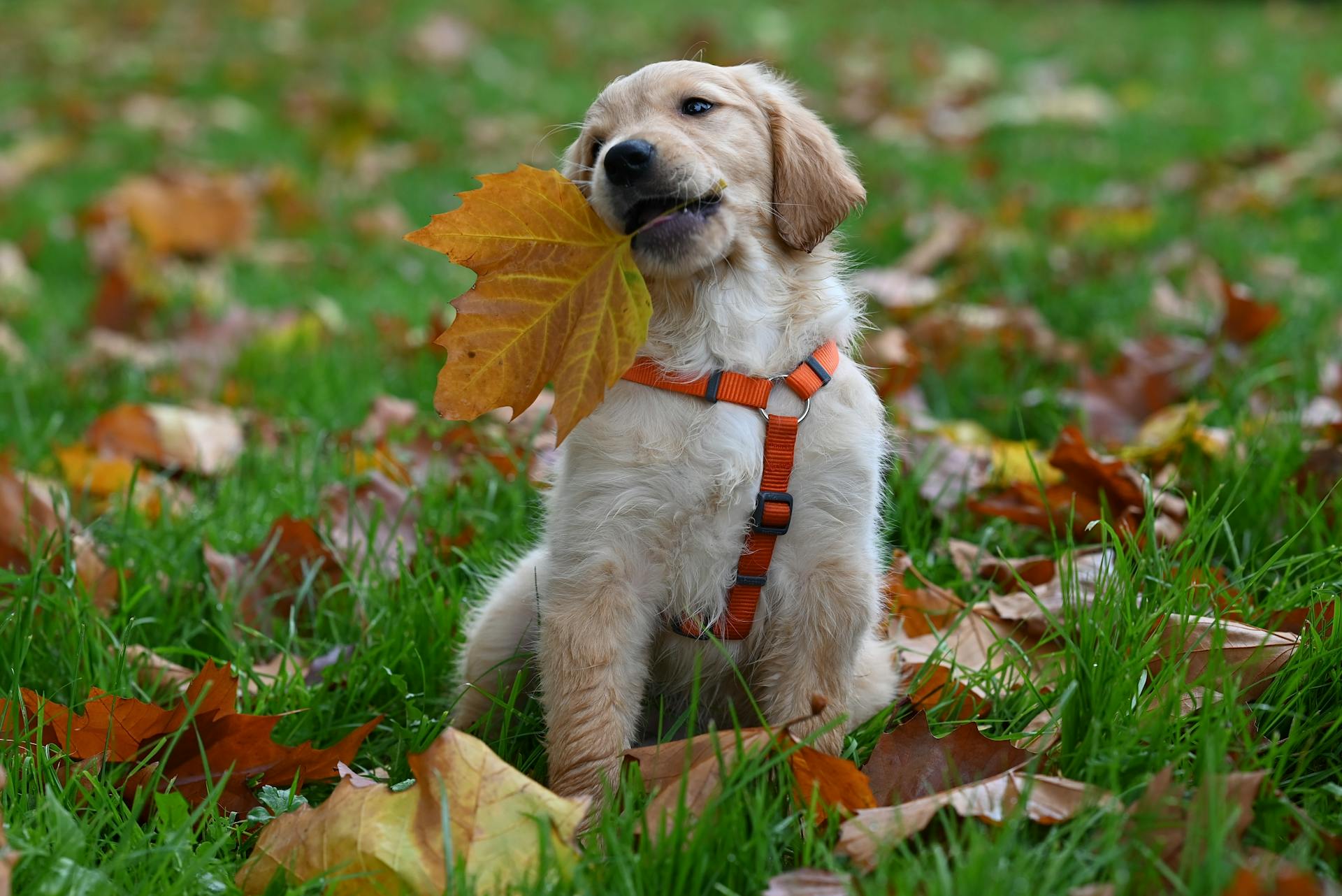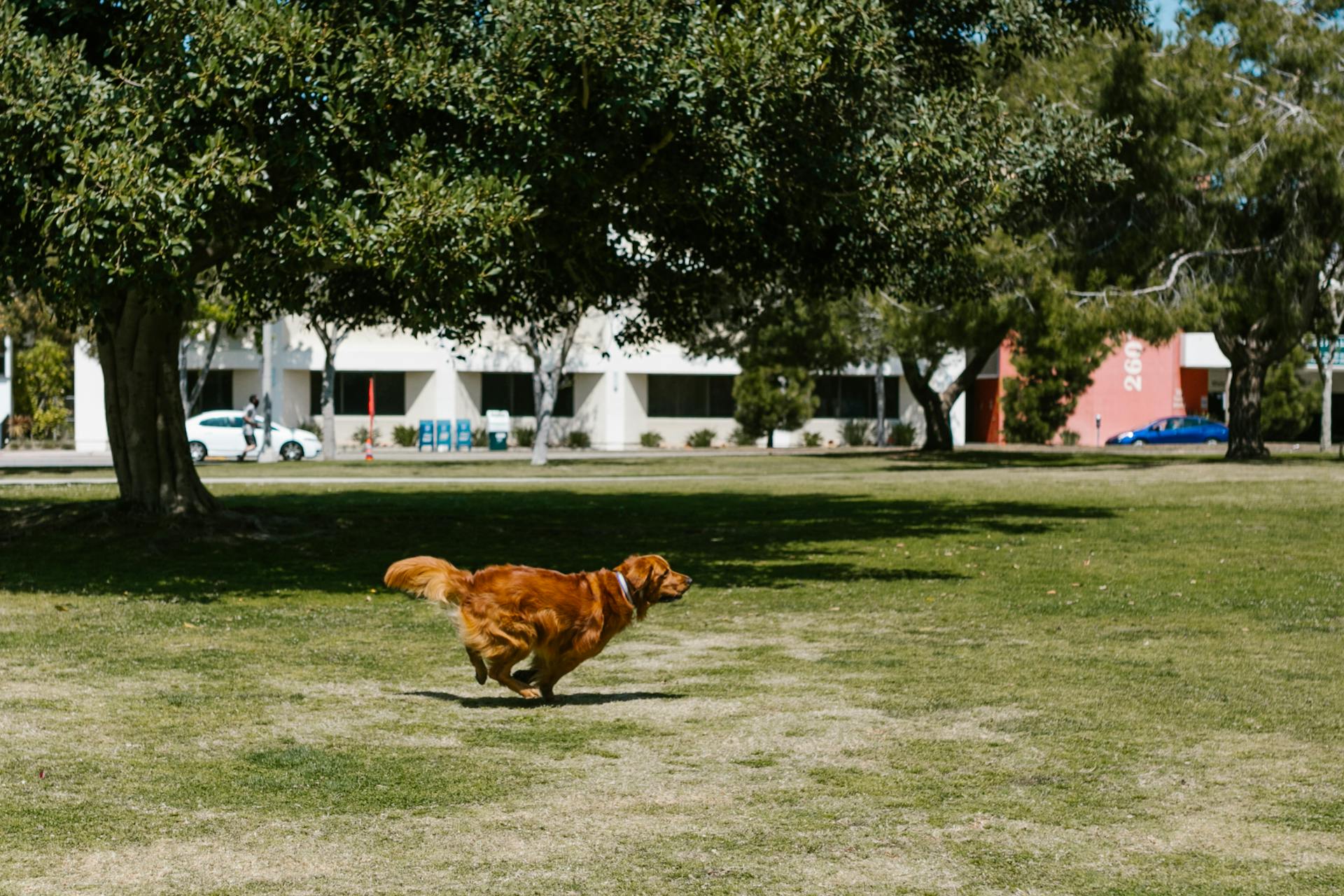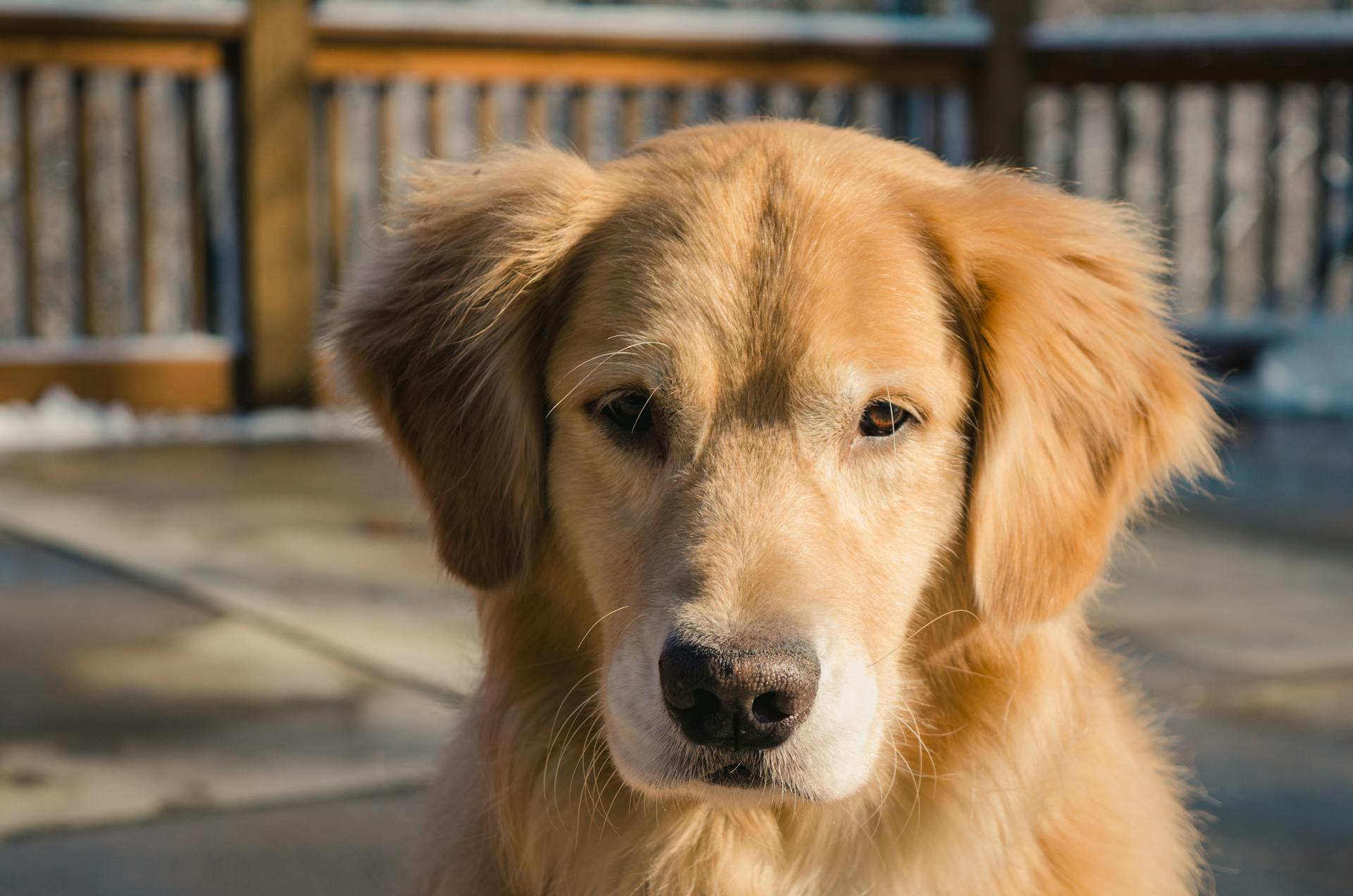
Golden Retrievers are known for their boundless energy, which can be both a blessing and a curse for their owners. They require regular exercise to keep them happy and healthy, so be prepared to take them on daily walks and playtime.
On average, a Golden Retriever needs at least 30 minutes of exercise per day, which can be broken up into shorter sessions. This can include running, swimming, or even just playing fetch in the backyard.
Golden Retrievers also have a natural instinct to herd and retrieve, which means they love to run around and play fetch. In fact, research suggests that Golden Retrievers are more likely to develop separation anxiety if they don't get enough physical and mental stimulation.
As a result, it's essential to find ways to channel their energy into productive and fun activities, such as agility training or obedience classes. This will not only tire them out but also provide mental stimulation and strengthen the bond between you and your Golden Retriever.
Understanding Hyperactivity in Dogs

Golden Retrievers are naturally energetic dogs, especially during their younger years. They love to be active and can keep their families entertained and on their toes. However, their energy levels can vary among individual dogs.
Several factors can influence a Golden Retriever's energy levels, including age, genetics, health, and training. As they age, Golden Retrievers typically become less energetic, with puppies and adolescents being the most energetic. A dog's genetic makeup can also impact their energy level, with some Golden Retrievers inheriting a more relaxed demeanor.
Here are some key factors to consider when managing your Golden Retriever's energy:
- Age: Puppies and adolescents tend to be more energetic, while adult and senior dogs are calmer.
- Genetics: Some Golden Retrievers may inherit a more relaxed demeanor, while others may be naturally more energetic.
- Health: Healthy dogs usually have more energy, while dogs with health issues might be less active.
- Training and Socialization: Proper training and socialization can help manage a dog's energy level.
Are All Dogs High?
Not all dogs are high energy, but many breeds, like Golden Retrievers, are naturally more energetic than others. Some Golden Retrievers, especially females, mature faster and become calmer with age.
Golden Retriever puppies are often extremely high energy and require a lot of attention and playtime to burn off their excess energy. They're developing social skills and learning to navigate their surroundings.

Their historic role as working dogs, bred to hunt and track, has given them a genetic predisposition for high energy and stamina. They were used to keep up with birds over long distances, which means they're built for action.
Most Golden Retrievers love to be outside and engage in physical activities, which helps them expend their energy and build relationships with their human family. They're designed to be active companions, not couch potatoes.
Factors Influencing Levels
As you try to understand why your Golden Retriever is so hyper, it's essential to consider the various factors that influence their energy levels. Age is a significant contributor, with puppies and adolescents being the most energetic, while adult and senior dogs tend to be calmer.
Golden Retrievers are naturally high-energy dogs, especially during their younger years. They love to be active, and any activity makes them happy. However, each dog is unique, and energy levels can vary among individual Golden Retrievers.
Genetics also play a role in determining a Golden Retriever's energy level. Some dogs may inherit a more relaxed demeanor, while others may be naturally more energetic. A dog's health can also impact their energy levels, with healthy dogs usually having more energy than those with health issues.
Proper training and socialization can help manage a dog's energy level. A well-trained and socialized dog may be better able to control their excitement and energy. Regular exercise, mental stimulation, and a consistent daily routine can also help promote a calmer demeanor in your Golden Retriever.
Here are the key factors that influence a Golden Retriever's energy levels:
- Age: Puppies and adolescents are the most energetic, while adult and senior dogs tend to be calmer.
- Genetics: Some Golden Retrievers may inherit a more relaxed demeanor, while others may be naturally more energetic.
- Health: Healthy dogs usually have more energy than those with health issues.
- Training and Socialization: Proper training and socialization can help manage a dog's energy level.
Managing Hyperactivity
Managing hyperactivity in Golden Retrievers is crucial to prevent restlessness and pent-up energy. A minimum of 30 minutes of exercise per day is usually sufficient to keep your Golden Retriever calm and relaxed.
If your Golden Retriever hasn't been walked, played with, or let outside for several hours, they will get restless and want to let out that pent-up energy. Regular exercise helps burn off excess energy and prevents behavioral problems associated with pent-up energy.

To combat hyperactivity, create a "calm zone" in your home, setting up a cozy, quiet space for your dog to unwind. Dim the lights, play soft music, or use white noise to create a soothing atmosphere.
A consistent exercise routine is vital for a Golden Retriever's well-being, aiming for at least an hour of exercise daily to help them burn off excess energy. Engage in walks, runs, hikes, swimming, or playing fetch to keep your Golden Retriever physically fit and mentally stimulated.
Here are some tips to help your Golden Retriever relax:
- Use calming aids like sprays, diffusers, or calming treats.
- Massage your Golden Retriever gently to release tension and promote relaxation.
Regular socialization opportunities, such as visits to dog parks or playdates with well-behaved dogs, are essential to burn energy, help develop social skills, and reduce the risk of behavioral issues.
The Puppy Phase
Golden Retriever puppies are known for their hyper and energetic behavior, especially during this phase.
They love to play and explore their surroundings, which can lead to zoomies - racing around at top speed, often in circles or figure eights.

Playful biting is also common as they use their mouth to explore the world around them.
Destructive behavior, such as chewing on furniture and shoes, is not uncommon in hyper Golden puppies.
Regular physical activity is crucial for helping Golden Retriever puppies burn off their excess energy.
Puppies that receive consistent exercise tend to calm down sooner than those who don’t get enough activity.
Mental stimulation, like puzzle toys and training, can also help tire out your energetic puppy.
Here are some common signs of a hyper Golden Retriever puppy:
- Zoomies: racing around at top speed
- Playful Biting: using their mouth to explore the world
- Destructive Behavior: chewing on furniture and shoes
Each Golden Retriever has its unique temperament, which can affect when and how much they calm down.
Some puppies may naturally be more relaxed, while others might remain more energetic even as they age.
Consistent, positive training from an early age can help teach your Golden Retriever self-control and good manners.
Maturation Process and Its Effect
Golden Retrievers are known for their boundless energy, but did you know that this energy level naturally decreases as they mature? Most Goldens calm down from their hyperactive phase to adulthood around 2 to 3 years of age.

This decrease in hyperactivity is a gradual process, and you may notice your dog becoming more focused and self-controlled.
During adolescence, which usually occurs between 6 months and 2 years of age, Golden Retrievers are prone to pent-up energy and acting out. This is due to fluctuating hormones and energy levels that make them test boundaries.
As your Golden Retriever matures, you can expect to see a significant decrease in hyperactivity, making them a more enjoyable companion.
Tips for Owners
To manage your Golden Retriever's high energy levels, it's essential to establish a consistent exercise routine. Aim for at least an hour of exercise daily to help them burn off excess energy.
Golden Retrievers require mental stimulation to keep their minds sharp and satisfied. Engage them in activities like puzzle toys, obedience training, scent work, or interactive games that challenge their intellect.
A "calm zone" can be created to help your Golden Retriever relax. Set up a cozy, quiet space for your dog to unwind.
To provide mental stimulation and prevent boredom, try activities like puzzle toys, obedience training, scent work, or interactive games.
Golden Retrievers are social creatures and thrive on human companionship. Regular socialization opportunities, such as visits to dog parks, playdates with well-behaved dogs, or joining obedience classes, are essential to their well-being.
Here are some key tips to help you manage your Golden Retriever's energy:
General Information
Golden Retrievers are a popular breed known for their friendly and gentle nature.
They typically weigh between 55-75 pounds and stand between 20-24 inches tall at the shoulder.
Golden Retrievers are often used as therapy dogs due to their calm and patient demeanor.
They have a thick double coat that sheds heavily, requiring regular grooming to prevent matting and tangling.
Golden Retrievers are highly intelligent and easily trainable, which makes them a popular choice for families and hunters alike.
Their intelligence and loyalty make them a beloved companion for many people.
Frequently Asked Questions
What does a golden retriever personality mean?
Golden retrievers are known for their calm, easy-going, and dependable nature, making them great companions. Their patient and diplomatic personalities help them navigate relationships with ease and harmony.
Sources
- https://www.sugarthegoldenretriever.com/2021/07/golden-retrievers-hyper-dogs/
- https://dogsforvets.com/when-do-golden-retrievers-calm-down/
- https://www.wikihow.com/Golden-Retriever-Energy
- https://collective.world/signs-your-guy-has-golden-retriever-energy-and-you-should-keep-him/
- https://medium.com/@goldenretrievercares/what-is-a-golden-retrievers-energy-personality-5-best-tips-ccd32fd49f4f
Featured Images: pexels.com


